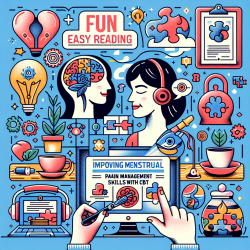Hey there! As a practitioner working in an educational setting, you're always looking for ways to improve your skills and help your students thrive. Today, I want to share some exciting insights from a research article titled "Evaluation of a group based cognitive behavioural therapy programme for menstrual pain management in young women with intellectual disabilities: protocol for a mixed methods controlled clinical trial." This study offers valuable lessons that can enhance your practice, especially when working with young women who have intellectual disabilities and experience menstrual pain.
Understanding the Study
This study aimed to evaluate a cognitive-behavioral therapy (CBT) program called "Feeling Better," designed specifically for young women with mild to moderate intellectual disabilities to manage menstrual pain. The participants were divided into two groups: one received the CBT intervention, and the other received usual care. The study assessed various outcomes, including pain coping strategies, pain management knowledge, and self-efficacy.
Key Findings and Implementation Tips
The research revealed several key findings that you can implement in your practice:
- Increased Coping Strategies: Participants in the CBT group reported using a greater number of coping strategies to manage menstrual pain. Encourage your students to explore different coping mechanisms, such as deep breathing, progressive muscle relaxation, and guided visualization.
- Enhanced Knowledge: The CBT group showed improved knowledge of pain management strategies. Educate your students about various pain management techniques and provide them with easy-to-understand resources.
- Self-Efficacy: Participants in the CBT group demonstrated higher self-efficacy in managing their pain. Foster a sense of empowerment in your students by helping them set achievable goals and celebrating their progress.
- Parental Involvement: The study emphasized the importance of involving parents or guardians in the intervention. Engage with the families of your students to ensure they are informed and supportive of the pain management strategies being taught.
Encouraging Further Research
While this study provides valuable insights, it's essential to continue exploring and researching effective pain management strategies for young women with intellectual disabilities. Here are a few ways you can contribute to this ongoing research:
- Stay Informed: Keep up with the latest research in the field of cognitive-behavioral therapy and pain management. Subscribe to relevant journals and attend conferences to stay updated.
- Collaborate: Work with other practitioners, researchers, and organizations to share knowledge and experiences. Collaborative efforts can lead to more comprehensive and effective interventions.
- Document and Share: Document your observations and outcomes when implementing new strategies. Sharing your findings with the broader community can contribute to the collective knowledge and help others improve their practice.
Conclusion
By incorporating the findings from this study into your practice, you can enhance your ability to support young women with intellectual disabilities in managing their menstrual pain. Remember, your efforts can make a significant difference in their quality of life and overall well-being.
To read the original research paper, please follow this link: Evaluation of a group based cognitive behavioural therapy programme for menstrual pain management in young women with intellectual disabilities: protocol for a mixed methods controlled clinical trial.










